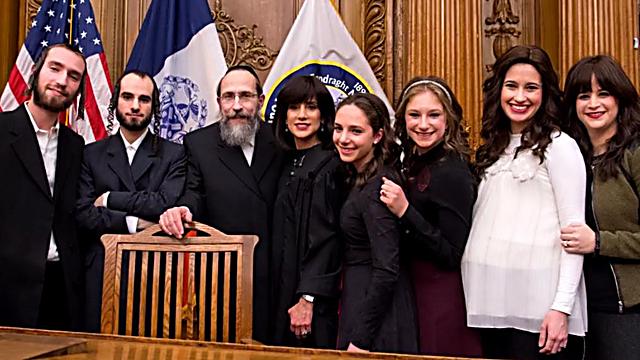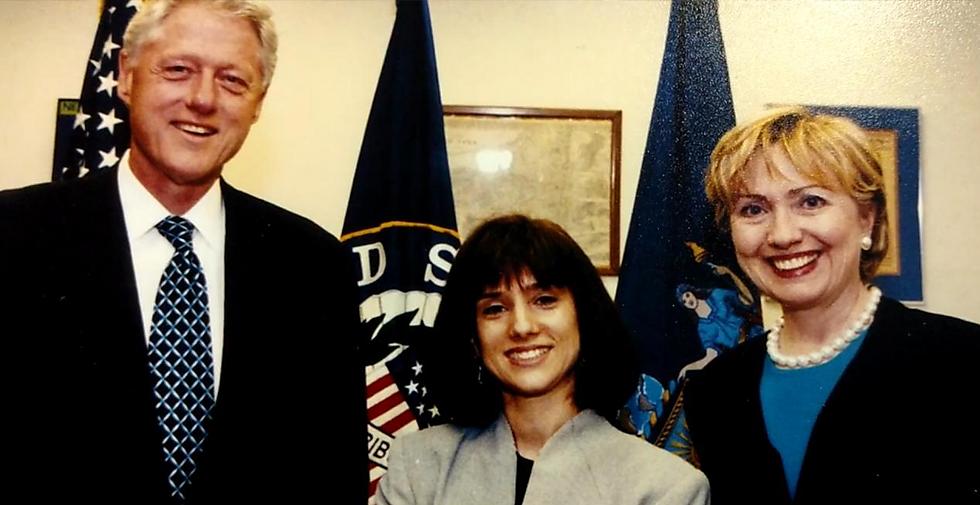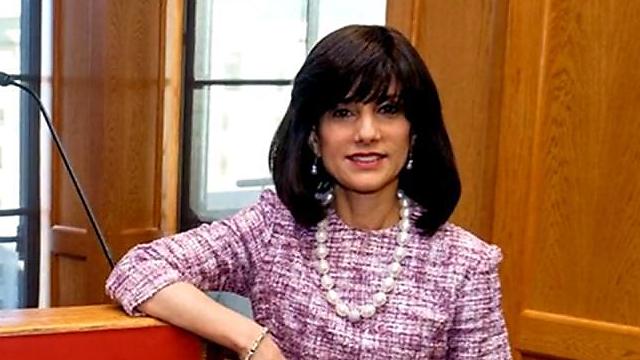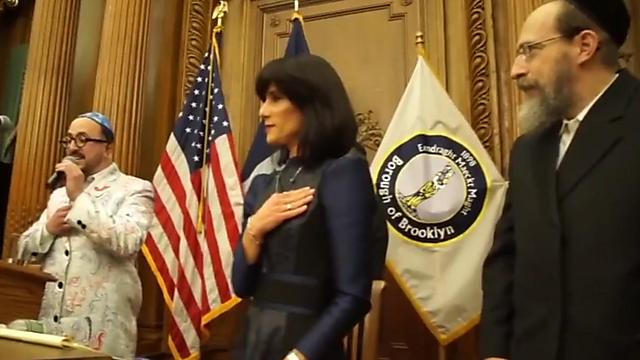She didn’t do it alone. She was backed by Brooklyn’s ultra-Orthodox community which voted for her and helped secure her victory in the three-way race.
A year later, Freier is sitting in the Criminal Court in Brooklyn and is well aware of her historic role. In a special interview with Ynet, she talks about the clear path she sees before her eyes, the values she has no intention of compromising on, and the status of women in the US Haredi community, whom she proudly represents.
Under the distinguished gown and the representative wig, Freier is a talented and articulate woman. Before her groundbreaking achievement as a judge, which received national media coverage in the US, she was one of the founders of the Ezras Nashim, an all-female Orthodox Jewish volunteer EMT ambulance service which was formed following a request to add a female corps of EMT volunteers to the all-male Hatzalah organization. The group was established with the goal of preserving women's modesty in emergency medical situations, especially childbirth.
But when she is asked to introduce herself, Freier said she is first of all a Haredi woman, like any other woman in Mea Shearim or Bnei Brak.
“First and foremost, I am a girl from Borough Park,” she said. “I am a wife and a mother and, God bless, a grandmother. Raising my family really is my primary role, and what I do in addition to that is I work in the legal profession.”
Freier has come a long way since her childhood in Borough Park to her inauguration ceremony, with famed Hasidic singer Lipa Schmeltzer singing the US national anthem with bits of Yiddish.
She studied in the Bais Yaakov schools, went to a seminary, married a Bobov Hasid and had six children. While raising her family, she decided to fulfill her dreams one by one.
Rachel Freier with her family. ‘My husband is the first Hasid that supported his wife, financed my campaign and didn’t stop until I won the election’ (Photo: Eli Mandelbaum)
She started out as a legal secretary, and then wanted to advance and became a paralegal. After earning a degree from Touro College, which offers academic programs for Haredim, she became a lawyer.
“My dream always was to become a judge, but what I didn’t realize was that I would end up becoming the first woman who is from a Hasidic background and a Hasidic family that would become a judge.”
When Freier began her rise to the top, she had very few women by her side. “There are a lot of women who are studying,” she said, “but the difference is they are really quiet, they don’t really take a public position.
“I did take a public position years ago, when I felt that it was important that the public know about my community. Because if you don’t go out and say who we are, then people are only going to see what they see in the media or in newspapers. Things that are negative that get out there, but the positive won’t get out to the public.
“So I took a position a number of years ago, back in 2007, when I was working as a new attorney in Monroe, so I could reach out to the media and tell them who we are, and I found that it was effective.
With Bill and Hillary Clinton. ‘If you don’t go out and say who we are, people are only going to see what they see in the media, and the positive won’t get out to the public’ (Photo: Eli Mandelbaum)
“At first, I was really nervous, because it’s not really done. Hasidic women do not go out into the forefront, into the media, but I felt it was a time to stand up. There will come a time when you’ll see that our Torah values are trampled and it’s wrong, because it’s not who we are as a community. So I came out and I took a public position.
“But there are many, many women who are trained, who are doing things they wouldn't have years ago. You just don’t know about them. But I knew.”
Nevertheless, how has the American Haredi community changed in recent years, being able to produce Haredi female judges—something Israel can only dream about?
“The Hasidic community hasn’t really changed. We still preserve our values very strongly. What has changed is the opportunities we have. Today, there are schools that are adapted to the Haredi community. There are many opportunities for a degree without compromising our values.
“Years ago, when someone wanted to go to college, they had to go to a non-Jewish, mixed institution with values that differ from ours, and study things that aren’t acceptable by our standards. Now, it’s changed. So in the American Hasidic community today there are more children who study and earn degrees, simply because the opportunities have changed, we haven’t. The world acknowledged that we have values and that it has to cater to our needs.”
Freier is everything Americans love: A woman from a cultural minority who managed to break the glass ceiling, aiming as high as possible. As a result, her victory in the September 2016 Democratic primary election for Civil Court Judge of the Kings County 5th judicial district, received wide coverage in the national American press, as she garnered 41 percent of the votes despite pessimistic forecasts.
"My priority always was that I didn’t want to compromise,” she said. “I wanted to bake challah for Shabbat, I wanted to still daven three times a day, I wanted to still be the mother for my children. I wanted nothing to change, even though I wanted to do something else.”
Freier. ‘The Hasidic community still preserves its values very strongly, but the opportunities have changed’ (Photo: Eli Mandelbaum)
Behind every Haredi woman who breaks a glass ceiling stands a supportive husband. “Without my husband helping me every step of the way, I couldn’t have gotten to this point,” Freier said, smiling. “In fact, I always say, people make a big deal I’m the first Hasidic woman, but the real big deal is my husband, because he’s the first Hasid that supported his wife, financed my campaign and didn’t stop until I won the election. So he’s really the hero of the story.”
As a member of the Bobov Hasidic community, Freier received her rabbis’ blessing on her road to success. “My husband ran around to rabbis and got endorsements for me,” she said, but stresses that “I never felt it was something I had to ask for.
“My husband would say, ‘My wife is studying, she wants a bracha, and she wants to help people.’ That really was my goal. My goal was that I should be able to use my legal background and my legal degree to help people. And I was, thank God, able to do that.
“I always worked together with rabbanim. My clients were Hasidim, and I was able to bridge the gap, fill in that space that was missing between my people and the professional world.”
While the Israeli High Court of Justice has to deal with petitions filed by Haredi woman who wish to take part in politics but are excluded by their parties, the gap between the communities here and there is quite impressive.
“My community is very excited,” Freier said. “You know, they voted for me. My position didn’t just come to me. I had to run. There was an election, and I had two opponents running against me. My community voted for me. This isn’t just something that happened by itself. My community made it happen. They’re very excited, very proud, the men and the women, and I’m very thankful to them.”
Freier believes that hard work pays off. “My message to everybody is: don’t compromise your values—not your religious values, not your family values. Be proud of who you are, and you can still be successful. It may take you longer—it took me over 20 years—but ultimately that’s the truth, that’s what will withstand the test of time.
“People have to know that just wanting to do the right thing doesn’t mean it’s going to be easy. You want to do something that is right? Expect challenges, expect it to be difficult. People think it was easy for me, but even today I still have challenges. There are things I’m still trying to achieve, like with the Ezras Nashim organization.
“In fact,” she said, “in Israel I could have been much more effective, because they already have a Hatzalah organization for women there. But here in Brooklyn, it’s much more difficult. But if something is difficult, it must be worth the effort.”
Don’t compromise your values, first Hasidic female judge tells fellow women : http://ift.tt/2noiFrc
No comments:
Post a Comment